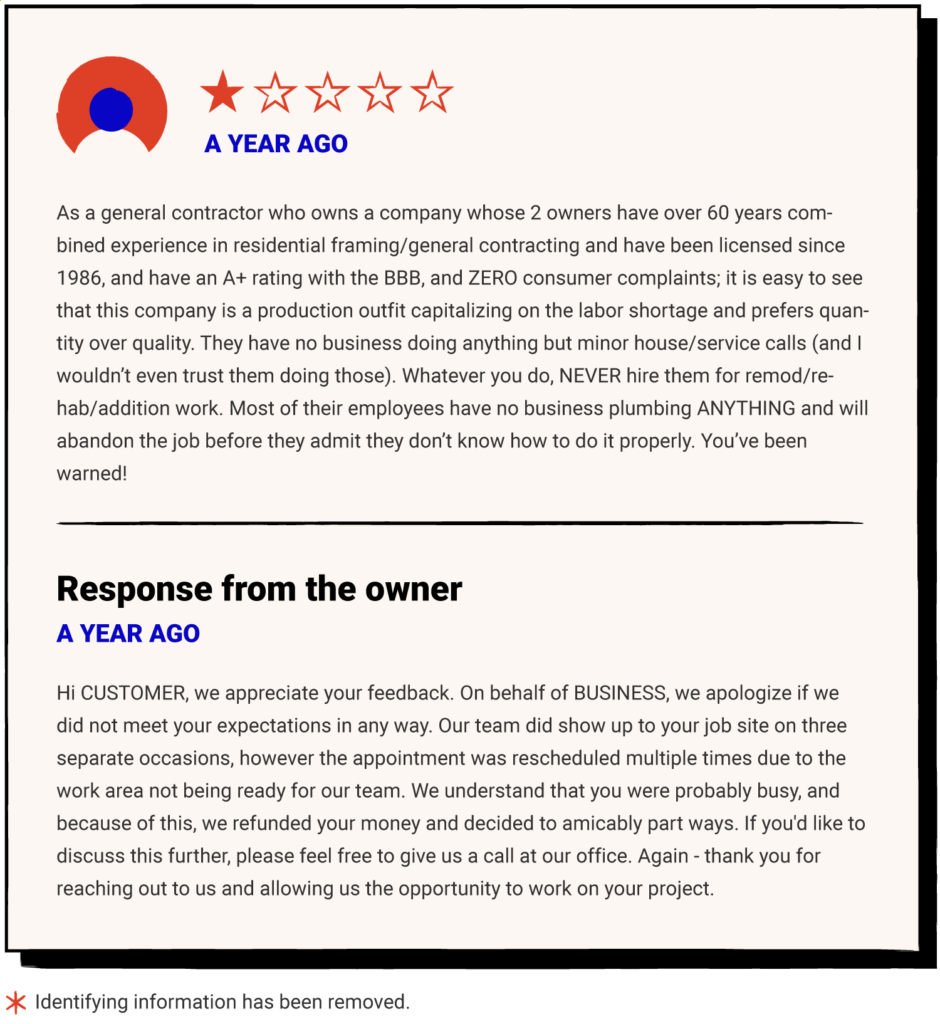Yelp, Google My Business, and TripAdvisor are just a few of the places that your customers learn more about your business. You should claim your profiles on these sites if you haven’t already, especially if you’re a small business that relies on local customers! You’re missing out on new customers and sales if you neglect review sites.
A study from Yelp found that 97% of people make a purchase after visiting Yelp. A Pew Research study also found that half of the adults under 50 routinely check online reviews before buying new items.
Once you have your profile, you also need to respond to reviews that come in. BrightLocal found that 26% of consumers expect you to respond to reviews in two days. This is where it gets tricky. Negative feedback about your business is already difficult to swallow at times. It’s especially difficult when some customers leave reviews that are unfair or untrue.
Below, we’ll go over some simple steps you can follow when you get a negative review. We’ll also show you a real example so you can see what this looks like in action.
Step #1: Don’t Delay
Customers don’t like to be kept waiting, even online. Carve out time in your schedule to respond to reviews. If you don’t have time, delegate this task to someone you trust on your team. Responding to reviews should be a priority so you can show your customers that you care. It’s also an opportunity to save a relationship with the customer who left the bad review.
Step #2: Keep Your Cool
Unfortunately, not everyone is nice when they leave a review. Some people throw unnecessary insults or exaggerate their experiences. It’s easy to lose your cool, but you need to take a few breaths before you respond.
It’s not fair or okay for anyone to take their anger out on your business in a review. However, many people read these reviews and don’t know the full story. It’s up to you to take the high road and be honest about what happened.
It’s much better to lead with empathy, apologize, and address that customer’s concerns. If a customer is lying, politely point out what actually happened. Keeping your cool doesn’t mean you can’t correct the customer. It means you need to respond with a level head to avoid saying something you might regret. Remember, your response is an example of what future customers can expect when they work with your business.
Step #3: Apologize
You must apologize, even if what happened to them wasn’t your fault. The least you can do is empathize with them and apologize that they had a poor experience. This will help them see that you understand their frustration and that you sincerely wanted them to have a great experience with your business.
You should absolutely apologize if the issue they raised is your fault. The key is not to dwell too much on the apology. You’ll start to sound insincere if the bulk of your response is you apologizing over and over.
Instead, you should apologize, briefly explain why this might have happened, and explain what you’re doing to make sure it doesn’t happen again. This gives this customer and future customers context on what happened. It also demonstrates that you care about making things right.
Step #4: Connect In Real Life
Lastly, you should give the reviewer options to reach you directly by phone or email. This naturally takes the conversation offline and allows customers to follow up with you. You may need to take it offline if you need any personal info to issue discounts or refunds.
Real Example
This is an example of a customer who spent a lot of time complaining about the business without saying much about what went wrong. Reviews like this are tough to respond to if there’s not much context about what happened. However, it seems like this business owner knew the reviewer and shared some additional details in their response.
<p><strong>Please include attribution to Womply with this graphic.</strong><br /><br /><a href=’https://www.womply.com/blog/how-to-respond-bad-reviews’><img src=’https://www.womply.com/wp-content/uploads/2021/07/bad-contractor-review.png’ alt=’contractor review example’ width=’750px’ border=’0′ /></a></p>
The business owner led with an apology and explained why they weren’t able to complete the service they promised. We learned that the business owner offered a refund and was willing to discuss any other concerns.
From this review alone, it seems like the business owner did everything they could to do the right thing. Although they could’ve been equally as upset as the reviewer, they responded calmly and respectfully instead.
Womply put together a big guide to help business owners respond to negative reviews if you’d like to read more. They include real examples, templates, and tips so you can feel prepared for the next bad review that might come your way.
Now that you’re a pro at responding to bad reviews, you can also focus on improving your future reviews. You generally want your good reviews to outnumber the bad. Read our guide to getting better online reviews to learn more.

